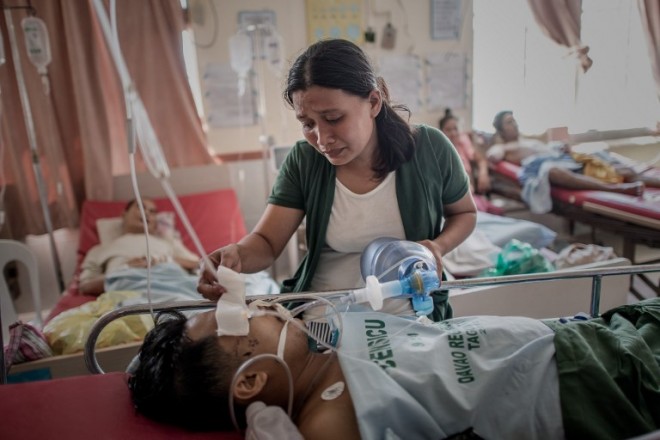No end in sight for ‘Yolanda’ widow’s woes

This file photo taken on Nov. 15, 2013, shows typhoon victim Jennifer Pulga checking on her husband as she keeps him alive by manualy pumping air into his lungs following his leg amputation that led to an infection, at the Divine Word hospital which still operated without electrical power on the 7th day of the Typhoon Yolanda disaster in Tacloban. AFP PHOTO/PHILIPPE LOPEZ
SAN AGUSTIN, Philippines—Jennifer Pulga endured the depths of helplessness as she pumped the last air her husband would breathe into his typhoon-battered body, and her life since has felt barely any more in control.
A coconut tree crashed through the thatched roof of the Pulga’s tiny home in an isolated farming village in Leyte during Super Typhoon Yolanda in November, crushing Richard and igniting a torturous passage to death.
With no vehicle to evacuate the farmer and roads in the area initially unpassable due to typhoon debris, it took his wife a week to get him to the nearest major hospital 60 kilometers away.
But that hospital, in the ruined city of Tacloban, was overwhelmed and medics could do little for Richard other than amputate one leg and give Jennifer a pump to manually inflate his lungs.
Jennifer kept her husband alive for seven hours, the sound of the handheld ventilator like a mournful fog horn amid a sea of agony as other patients died from injuries that doctors said could have been treated if there was electricity and medicines.
Article continues after this advertisement“I was praying and hoping that he would live. I was praying that even if he is disabled, that’s okay, as long as he lives, that’s all I want,” Jennifer, 28, told AFP on a recent visit to see how she was coping.
Article continues after this advertisementPoverty deepens grief
Compounding the grief of losing her husband of seven years, Jennifer was left destitute with a 4-month-old daughter, Irish, and a 6-year-old son, RJ.
Yolanda, which was one of the most powerful storms ever recorded, is believed to have killed about 8,000 people, mostly in farming and fishing communities that were already among the poorest in the Philippines.
The Pulga family comes from one of the most impoverished of those farming villages, in a scenic but unruly part of Leyte province known as a haven for communist guerrillas and other armed bandits.
The Pulgas lived in a dirt-floor hut made of bamboo, coconut wood and palm thatch, tending 10 hectares of coconut tree plantations and a one-hectare rice field left to them by Richard’s deceased father.
Richard, who died aged 27, would earn some extra money giving rides on his motorcycle along a rocky track to people in his and neighboring villages.
Lost to Yolanda
The farm and Richard’s motorcycle riding earned them about P3,000 a month, just enough to survive when supplemented by vegetables they grew for themselves and pigs raised for food.
Like thousands of other farmers in the region, the family’s main source of income was lost when Yolanda destroyed most of their coconut trees, which take more than five years from planting to bear fruit.
“I don’t have anything now, Richard was our breadwinner,” said Jennifer, whose only previous paid work was as a domestic helper in Manila, when she was a teenager.
The young widow and her two children went to live with Richard’s 68-year-old mother, Guadalupe, in a neighboring village.
The in-law’s two-story concrete house had its roof partially ripped off during the typhoon and has still not been repaired, although it provides adequate shelter and RJ can attend the local school for free.
Surviving on donations
But the two women have no source of income, and are almost totally reliant on food aid that has been delivered by the government and relief agencies.
Guadalupe has another farmer son, but one of his children was killed and house destroyed in the typhoon, so is unable to provide financial help.
“We are just living day-to-day. We are trying to do the best we can but we don’t have any money. So we are just concentrating on what we have now. If there’s none, well, that’s it,” Guadalupe said.
Jennifer has nine siblings but their financial health is little better, and the only contribution from her immediate family since Richard’s death has been a P1,000 donation from a sister.
“I just wish I can find a job, for my children, for the future of my children. That’s all I wish for in life, that I can support my children until they grow up,” she said.
But Jennifer said a higher priority for the moment was breastfeeding Irish, ruling out travelling for work.
Impossible dream
Jennifer’s ideal job would be to run a small stall outside her mother-in-law’s home, selling daily household items and food, so that she could stay close to her children.
She estimates setting up the business would cost about P10,000, an impossible amount.
And while billions of dollars are being spent in an effort to help the typhoon-hit areas recover, little of it appears to be trickling up to the base of the picturesque mountains where the Pulgas live.
Aside from the food aid, Jennifer and her in-laws said they had been offered no other support, such as money, materials or expertise to help rebuild or repair their homes and farms.
Still, Jennifer appears not to be focused too much on the future, with her concentration dominated by the struggles of surviving each day and the ceaseless grief.
“Now I am alone and I can’t bear it,” she said.